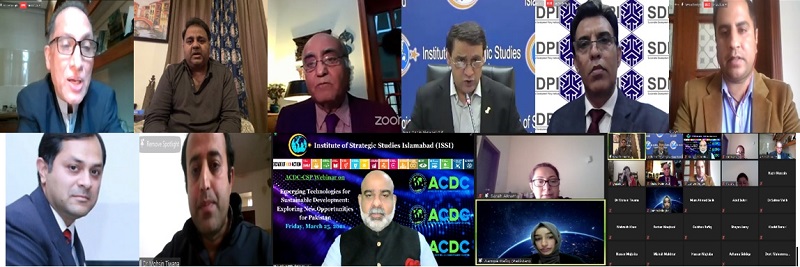ACDC–CSP Webinar
on
“Emerging Technologies for Sustainable Development: Exploring New Opportunities for Pakistan”
Thursday, March 25, 2021
Press Release

“We need a national environment where policies encourage technological innovations and exploration of new ideas.” This was stated by the Federal Minister for Science and Technology, Chaudhry Fawad Hussain, in his keynote address at the webinar on “Emerging Technologies for Sustainable Development: Exploring New Opportunities for Pakistan,” held by the Arms Control and Disarmament Centre (ACDC) in collaboration with the Centre for Strategic Perspectives (CSP) at the Institute of Strategic Studies Islamabad (ISSI) on March 25, 2021. Mr. Najam Rafique, Director CSP-ISSI, moderated the webinar.
The honourable Federal Minister provided a comprehensive historical overview of the various technological initiatives taken by Pakistan to set up its national science and technology regime since the1960s. However, the political instability, a technological disconnect between civil and defence sectors and an unnecessary ban on technologies and tech companies greatly affected this process. He also highlighted the recent initiatives like the new national drone policy and the establishment of a national board for the regulation of technologies.
While welcoming the guests, Ambassador Aizaz Ahmad Chaudhry, Director General ISSI, said that human development has always been impacted by the technological advancements in that particular era in history. However, the unprecedented transformations in speed, accuracy and range of emerging technologies in the contemporary era necessitate their effective and robust utilisation for sustainable development more than ever.
Earlier in his introductory remarks, Malik Qasim Mustafa, Director ACDC at the ISSI, said that emerging technologies could help in poverty reduction, decreased carbon emissions, revolutionise global connectivity, transform global mobility, improving health care, education, agriculture and energy sectors. Talking about the unequal accessibility to these novel technologies across the globe in an era of the COVID-19 pandemic, he emphasised that it is the collective responsibility of technologically advanced states to share and transfer technological know-how through a sharing mechanism at the regional and international level.
Ms. Sarah Akram, Research Fellow CSP-ISSI, and Ms. Aamna Rafiq, Research Associate ACDC-ISSI, gave a briefing on the subject. The aims of Sustainable Development Goals (SDGs) are achieving sustainable development, equality and poverty reduction. Referring to the recent report by the World Economic Forum (WEF), they said that the Fourth Industrial Revolution (4IR) technologies like artificial intelligence, robotics, blockchain, quantum computing, informational and communication technologies (ICTs), 5G and nanotechnology could have a high impact across 10 SDGs and that seventy per cent of the 169 targets underpinning the goals could be enabled by these emerging technology applications.
Dr. Abid Qayyum Sulehri, Executive Director Sustainable Development Policy Institute (SDPI), expressed his views on “Role of Emerging Technologies in Achieving SDGs in Pakistan.” He said that emerging technologies are enhancing human productivity as well as the optimal utilisation of natural resources. He highlighted the role of big data and the Internet of Things (IoT) in the upcoming SDPI’s Food Dashboard project. This dashboard will map the availability, demand and pricing of essential food commodities at the district level in Pakistan.
While talking about the “Practicalities of Blockchain for the SDGs in Pakistan,” Dr. Usman Chohan, Director for Economics & National Affairs, Centre for Aerospace and Security Studies (CASS), Islamabad suggested that Pakistan should build a regulatory framework for cryptocurrencies that is compliant with the local and foreign stipulations. In addition to encouraging supply chain efficiencies and productivity, a serious approach is required for environmental and institutional applications of blockchain technology like climate change, water and land registry.
While expressing his views on “Technology Roadmap: A Way Forward for Pakistan,” Dr. Mohsin Islam Tiwana, Head of Research Department and GM Technology at NUST College of EME, Islamabad said that the policy-makers should master these technologies for making transparent policies and regulatory mechanisms instead of a ban. Government should also enable the early adoption of these technologies in changing global work structure.
Mr. Khawaja Mohammad Ali, Chief Information Security Officer at the Agricultural Development Bank of Pakistan (ADBP), in his presentation emphasised the development of new AI models to deal with the challenges like technological lag in the rural areas of Pakistan, digitalisation of financial transactions and Bitcoin management.
The presentations were followed by an extensive question and answer session.
Towards the end of the webinar, Ambassador Khalid Mahmood, Chairman BoG ISSI, said that the Sustainable Development Agenda 2030 is a great initiative and emerging technologies can accelerate the process of achieving this agenda. To intensify their applications, it is important to fill the gaps in the policy-making, capacity building mechanisms and public awareness campaigns.











